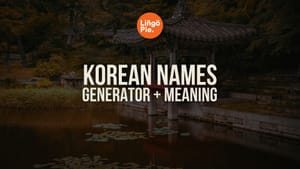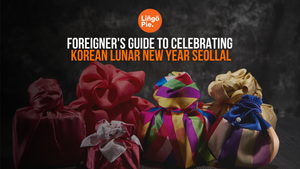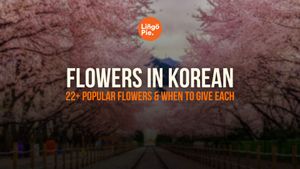Remember how Thanos (Player 230) in Squid Game Season 2 made everyone's hearts flutter when he rapped "I like you" to his senorita? Just imagine if he'd thrown in some sweet Korean terms of endearment instead - that scene would've been even more swoon-worthy!
In this post, I'll share 50 Korean terms of endearment that will help you understand the depth of emotion in your favorite Korean shows and songs. Whether you're learning Korean or just curious about the culture, these terms will show you why Korean is considered one of the most romantic languages out there.
- Happy Birthday In Korean: 7 Best Birthday Wishes
- Family Members In Korean [A Complete Guide]
- Everything You Need To Know About Korean Honorofics

Korean Terms Of Endearment
Traditional Terms of Endearment
These are the most common and classic Korean expressions of love, typically used between couples in romantic relationships:
- 여보 (Yeobo) - A classic term used between married couples, similar to "honey" or "darling."
- 자기 (Jagi) - Equivalent to "baby" or "sweetie," used between couples.
- 애인 (Aein) – “Romantic partner / lover.”
A neutral and widely used term for someone you’re in a romantic relationship with. It can refer to a boyfriend, girlfriend, or partner without specifying marital status. - 부부 (Bubu) – “Married couple.”
Refers to a husband and wife as a unit. Commonly used in formal contexts, media, or when talking about a couple’s relationship or household together. - 내 사랑 (Nae Sarang) - "My love," a straightforward but powerful declaration of love.
- 사랑꾼 (Sarangkkun) - A lover or someone very affectionate.
- 보고 싶은 (Bogo Sipeun) - "Miss you," for someone you long to see.
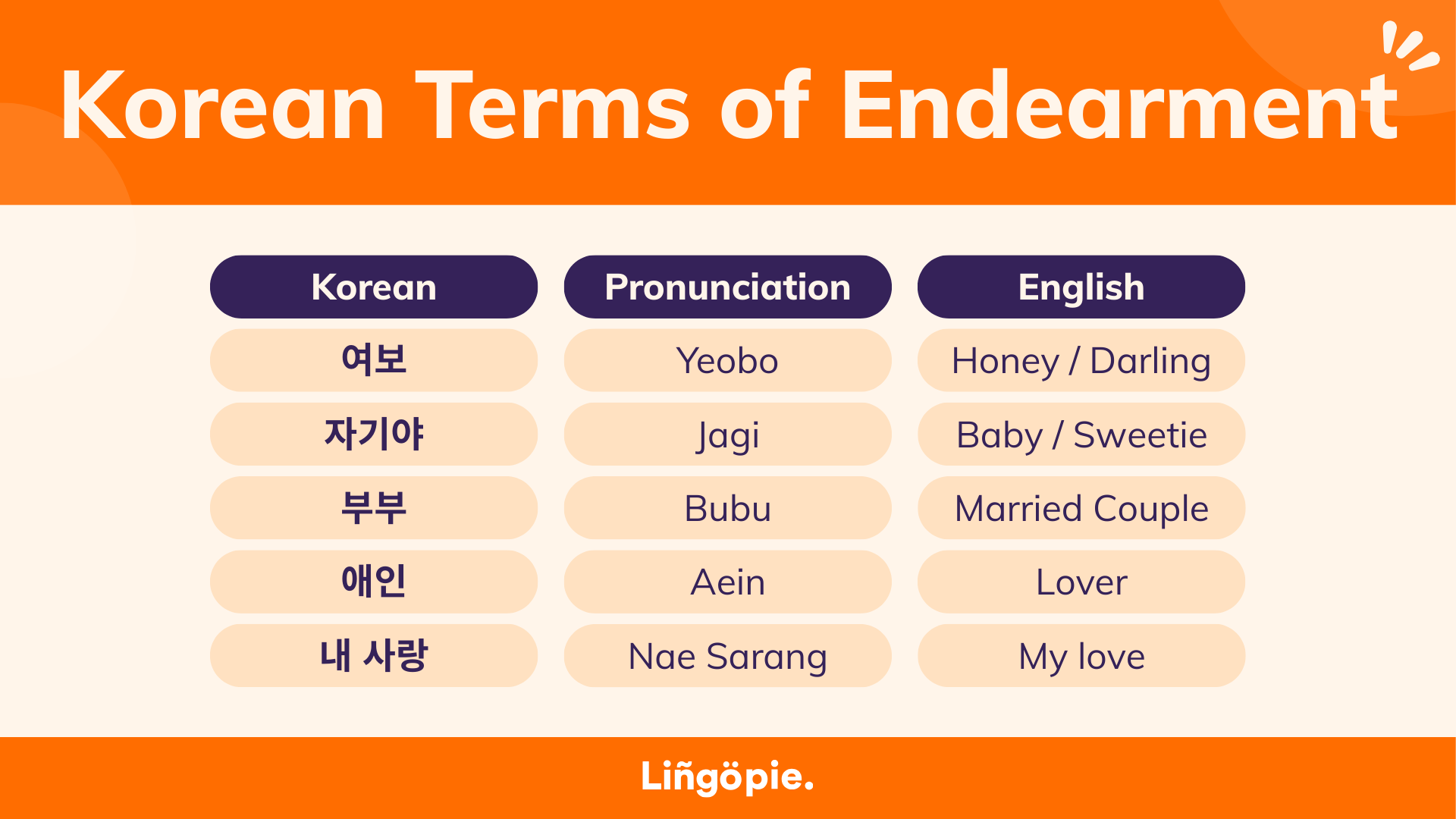
Age-Based Terms
In Korean culture, these terms show both respect and affection, with their usage determined by age and gender relationships:
- 오빠 (Oppa) - A term used by females to address an older male, often in a romantic context.
- 누나 (Nuna) - Used by males to address an older female, sometimes romantically.
- 형 (Hyung) - Used by males to address an older male, can be affectionate among close friends.
- 언니 (Unni) - Females use this to address an older female, also affectionately.
Nature & Celestial Terms
These poetic expressions use elements from nature to express deep affection and admiration:
- 해님 (Haenim) - "Sun," for someone who brightens your day.
- 별님 (Byeolnim) - "Star," for a person who lights up your night sky.
- 꽃길 (Kkotgil) - "Flower road," symbolizing a wish for a happy life path.
- 나비 (Nabi) - "Butterfly," symbolizing someone who brings color to your life.
- 해바라기 (Haebalagi) - "Sunflower," for someone who always makes you smile.
- 달님 (Dalnim) - "Moon," for someone who is a constant in your life.
- 햇살 (Haetsal) - "Sunshine," for someone who brightens your day.
- 별빛 (Byeolbit) - "Starlight," for someone who shines brightly in your life.
Sweet & Sugary Terms
These playful terms use sweet treats and honey-related words to express endearment:
- 꿀떡 (Kkul-tteok) - Literally means "honey rice cake," denoting someone very sweet.
- 달콤이 (Dalkom-i) - "Sweetie," for someone irresistibly sweet.
- 설탕 (Seoltang) - "Sugar," for someone sweet.
- 달고나 (Dalgona) - Referring to a sweet, sugary treat, used for someone very sweet.
- 꿀벌 (Kkulbeol) - "Honeybee," for someone hardworking and sweet.
Animal-Inspired Terms
These cute animal references are commonly used to express affection:
- 토끼 (Tokki) - "Rabbit," for someone cute or adorable.
- 강아지 (Gangaji) - "Puppy," denoting cuteness and affection.
- 고양이 (Goyangi) - "Cat," for the affectionately aloof.
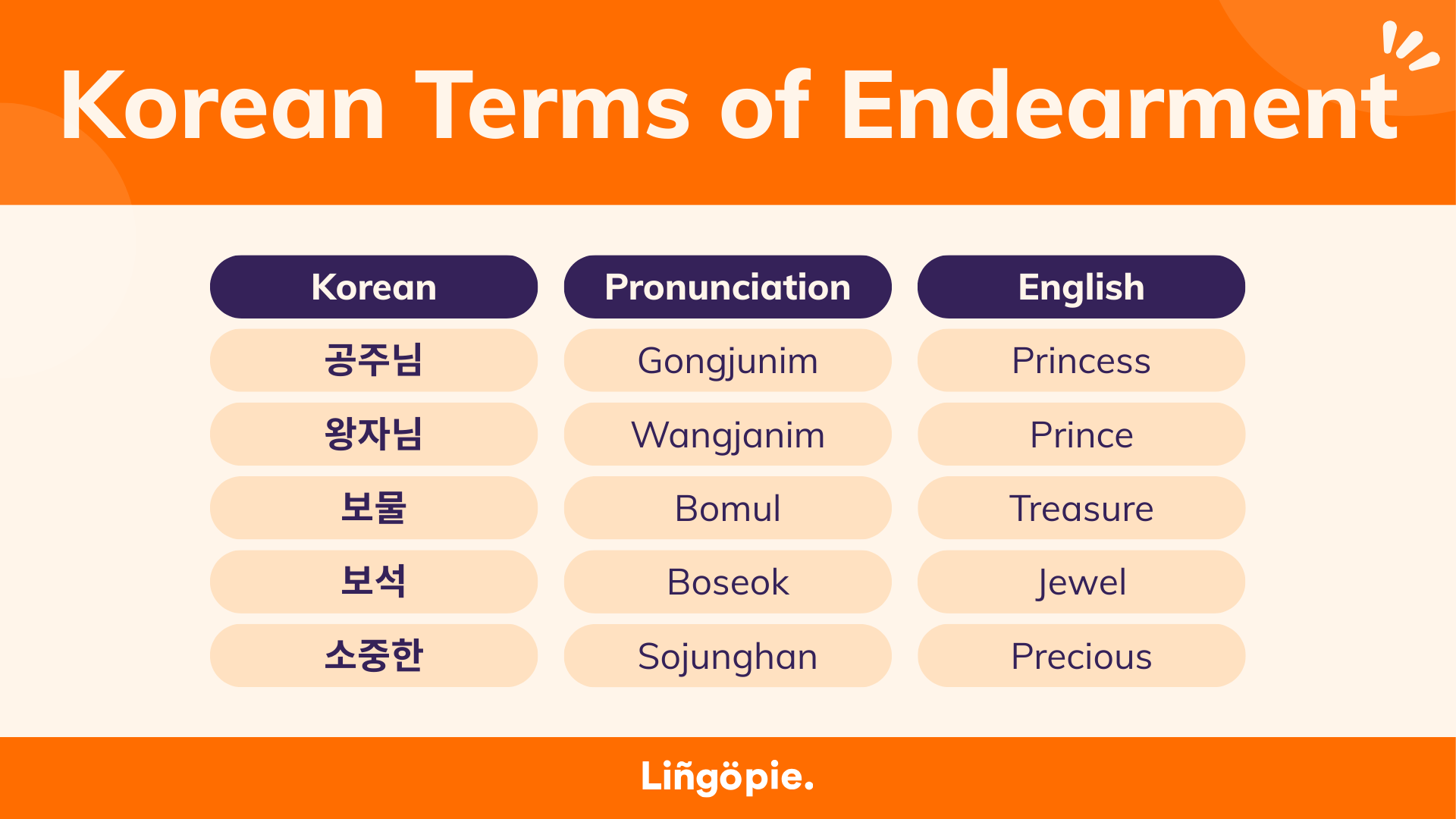
Royal & Precious Terms
These grand expressions elevate your loved one to a precious or noble status:
- 공주님 (Gongjunim) - "Princess," for someone precious and adored.
- 왕자님 (Wangjanim) - "Prince," a noble term of endearment.
- 보물 (Bomul) - Translates to "treasure," for someone you cherish deeply.
- 보석 (Boseok) - "Jewel," for a person of great value in your life.
- 소중한 (Sojunghan) - "Precious," for someone invaluable.
Spiritual & Dreamy Terms
These terms express magical and ethereal connections:
- 천사 (Cheonsa) - "Angel," for a person with a pure heart.
- 소울메이트 (Soulmate) - "Soulmate," directly borrowed from English, for your perfect match.
- 나의 천국 (Naui Cheonguk) - "My heaven," for someone who makes your life blissful.
- 기적 (Gijeok) - "Miracle," for someone who is a miracle in your life.
- 미소천사 (Misocheonsa) - "Smile angel," for someone whose smile is angelic.
- 꿈나라 (Kkumnara) - "Dreamland," for someone who feels like a dream.
- 마법사 (Mabeobsa) - "Wizard" or "magician," for someone who has a magical effect on you.
Personality Terms
These terms highlight someone's endearing qualities and character:
- 순둥이 (Sundungi) - A term for someone with a gentle and soft nature.
- 마음씨 (Maeumssi) - "Heart," for someone kind-hearted.
- 천재 (Cheonjae) - "Genius," for someone you admire for their intellect.
- 바보 (Babo) - "Fool," used endearingly for someone who's silly or cute in their actions.
Deep Affection Terms
These expressions convey profound emotional connections:
- 반쪽 (Banjjak) - Meaning "other half," perfect for your significant other.
- 나의 하늘 (Naui Haneul) - "My sky," for someone who encompasses your world.
- 나의 빛 (Naui Bit) - "My light," for someone who brings clarity and joy.
- 내 포근함 (Nae Pogeunham) - "My coziness," for someone who makes you feel safe and warm.
- 영원한 친구 (Yeongwonhan Chingu) - "Forever friend," for a lifelong companion.
Modern & Fun Terms
Contemporary expressions that add a playful touch to showing affection:
- 꿀잼 (Kkuljaem) - A slang term meaning "really fun" or "super enjoyable," used for someone who's a blast to be with.
- 비타민 (Vitamin) - For someone who energizes you and makes you feel better.
- 슈퍼스타 (Superstar) - For someone who stands out for their talent or charm.
Remember, using these terms appropriately depends on the level of intimacy and the context of your relationship, so it's always good to understand the nuances of their use.
Master Korean Terms of Endearment Through Entertainment
The best way to learn Korean terms of endearment isn't just memorizing them – it's seeing them in action. Here's how you can naturally pick up these sweet expressions while enjoying your favorite Korean content:
Start with Lingopie's K-Drama Collection
Watch Korean shows with the Lingopie extension to catch these terms in real conversations. When characters use terms like "yeobo" or "jagiya," you'll see both the Korean text and English meaning, helping you understand not just the words but the perfect moment to use them. Lingopie lets you click on any word to save it and dive deeper into its usage.
Ready To Speak Korean?
So you see, the Korean terms of endearment are more than just sweet words - they're windows into how Korean culture expresses love, respect, and affection. Whether you're practicing your Korean through Lingopie's interactive content or catching the latest K-dramas, these expressions will start feeling natural the more you immerse yourself in the language.
Ready to start your journey with Korean terms of endearment? Fire up Lingopie, pick your favorite Korean drama, and let these beautiful expressions of love enhance your language-learning adventure!
Frequently Asked Questions About Korean Terms of Endearment
What's the difference between 자기 (jagi) and 여보 (yeobo)?
While both are terms of endearment used between couples, 여보 (yeobo) is specifically used between married couples, similar to "honey" or "darling." Meanwhile, 자기 (jagi) is more versatile and can be used between dating couples or married partners, similar to "baby" or "sweetie" in English.
Can I use Korean terms of endearment if I'm not Korean?
Yes, you can use Korean terms of endearment appropriately when speaking Korean. However, it's important to understand their cultural context. For example, terms like 오빠 (oppa) have specific age and gender rules. Using them incorrectly might make Korean speakers uncomfortable or cause misunderstandings.
What's the most common Korean term of endearment in K-dramas?
오빠 (oppa) is arguably the most frequently used term of endearment in Korean dramas. While it literally means "older brother" when used by a female to address an older male, it has evolved to have romantic connotations in dating relationships, making it a staple in Korean romance dramas.
Why do Koreans use so many animal-related terms of endearment?
Animal terms like 토끼 (tokki/rabbit) and 강아지 (gangaji/puppy) are popular because they represent cute and lovable qualities in Korean culture. These terms are often used to express affection by highlighting someone's adorable or endearing characteristics, similar to calling someone "bunny" or "kitten" in English.


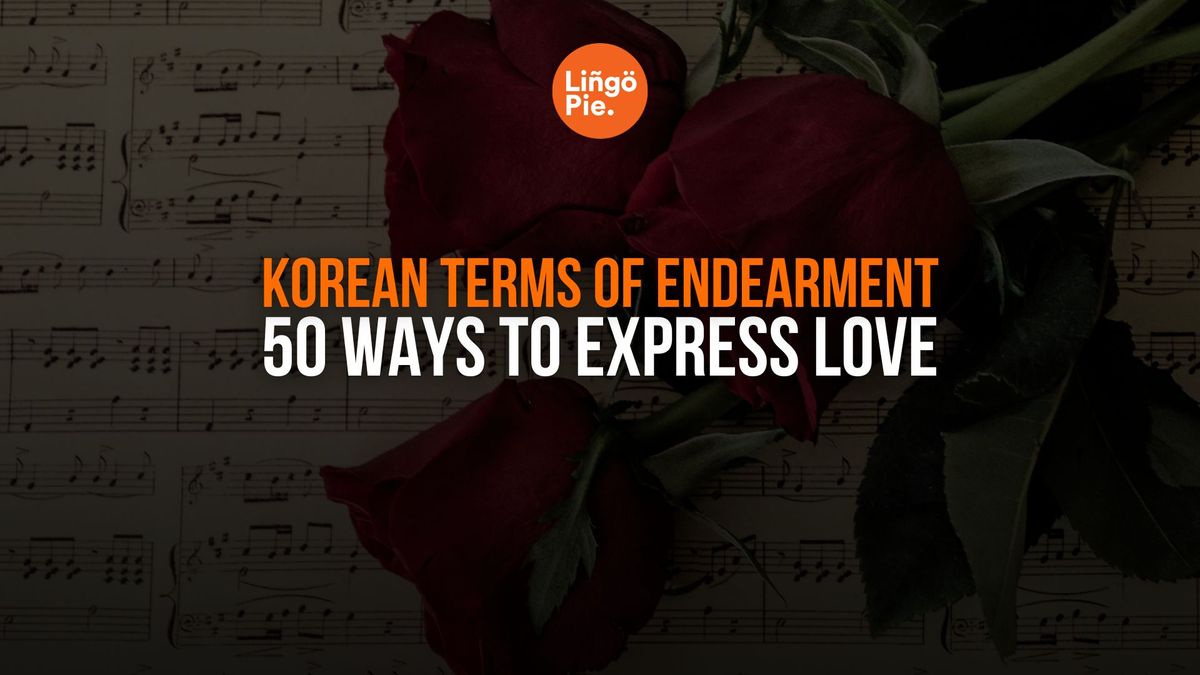


![6 Best Ways To Say Hello In Tagalog [A Traveler's Guide]](/blog/content/images/size/w1200/2024/07/6-Best-Ways-To-Say-Hello-In-Tagalog--A-Traveler-s-Guide-.jpg)
